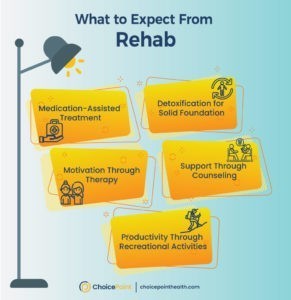There are a lot of misconceptions regarding rehabs. Most of these are assumed or learned from the experience of traditional, outdated rehab facilities. It is natural to feel intimidated by things you have never done before.
We know you are ready to change your life, so don’t let any misconceptions hold you back. We understand you are full of questions and fear, like what will happen here? How long is rehab? How much will it cost? What to expect in the long run? These are all valid concerns. This blog will share all the information about five things to expect during drug or alcohol rehab so you can mentally prepare yourself and make an informed decision.
Table of Contents
How Long is Rehab?
Well, rehab can take up to 6 months or more, depending on the individual condition. No one size fits all solution here. However, choosing a rehab program is a two-way process. After considering your concerns and needs, medical staff will suggest the best rehab program. The following factors usually decide how long rehab will last:
- Type of addiction (drug or alcohol)
- Level of addiction
- Relapse History
While six months may seem a lot, addiction treatment is a carefully crafted process. Longer duration in a facility helps solidify healthy habits and quick recovery from addiction. Therefore, it is often advised that patients must commit to at least a six months-long rehab plan for a sustainable recovery. The duration of rehab is decided according to the severity of the addiction. At ChoicePoint, every treatment option is discussed with the patient to reach a final decision according to what works for the patient. You can avail our free self-assessment to learn about your level of addiction severity.
Benefits of Long Rehab Programs:
The long treatment, such as a six months rehab plan, sounds difficult initially. However, you should see this time as an investment in yourself. Getting treatment and support for a longer period helps maintain a sober lifestyle in years to come. You get used to drug or alcohol-free routines. Thus, you get a solid ground for building new healthy habits.
Drug addiction is often associated with mental health problems. The human mind is complex. It can trick you into believing you are fully recovered while the truth is otherwise. If you hasten to return to your previous life, the chances of relapsing into drug addiction increase. Hence, it’s better to stay in rehab till complete recovery.
Benefits of Rehabilitation
Are you scared by the thought of being away from your friends and family to enter a rehabilitation program? With ChoicePoint outpatient and telehealth rehabilitation programs, you can recover without putting your life on hold. You can complete the treatment online or through outpatient rehab; you can attend the sessions in a safe environment that allows you to keep up your work schedule while staying close to your family during recovery.
5 Things to Expect During Rehab
Rehab begins with an initial assessment that is followed by personalized treatment plans. Here are the top 5 things that you can expect during rehab.
1. Intake Interviews:
Before starting a treatment plan, the medical staff spends enough time with you to understand individualized needs and prepare the patient-centric treatment program. Thus, the check-in step into rehab involves interviews.
Make sure to give accurate information during the intake interviews so the doctors can develop a personalized treatment plan for you. The interviews can sound intimidating, but, in the end, the treatment is for your well-being. Help yourself by helping the medical staff by giving accurate information.
2. Detoxification:
Most people consider detox as the most difficult step. You may experience some difficult days, but these initial difficulties will pave a beautiful path toward a peaceful and constructive life.
According to the United Nations Drug Treatment Toolkit, medical detoxification removes harmful substances from your body. It can trigger withdrawal symptoms. But don’t worry; medical professionals can help you cope with withdrawal symptoms through medications and therapies.
The length of detox varies by substance of choice.
- Alcohol detox can last between 2-7 days
- Benzodiazepine detox: 2-4 weeks
- Meth detox: 3-5 days
- Cocaine detox: 3-5 days
i. Medication-Assisted Treatment:
During detox, medical professionals may suggest a MAT program. Medications are prescribed to help reduce withdrawal symptoms and frequent drug cravings. Medicines used in MAT programs are safe and FDA-approved.
You may be prescribed some of these medications
- Suboxone – To treat opioid addiction
- Methadone – To reduce withdrawal symptoms
- Subutex – To treat both prescription-based and street drugs addiction
- Naltrexone – To treat drug and alcohol addiction
The detox process must be handled with great care. At ChoicePoint, the detox program is carried out under medical supervision. Professional medical practitioners carry out the process with the utmost professionalism. They provide excellent treatment so the patient can learn to reduce the need for substances during detox.
3. Therapy Sessions:
You should expect therapy sessions in all sorts of rehab centers. They speed up the recovery process and keep patients on the right course. You can continue to attend therapy after completion of your treatment program to avoid chances of relapse.
There are three types of therapies in rehab facilities.
i. Individual Therapies:
Individual therapy involves one-on-one sessions with the therapist. These sessions help you reflect on your life choices. You will get to know the problems caused by your addiction. Self-awareness brings a physical and mental willingness to change. Moreover, the patient feels more comfortable discussing his issues with the therapist in an intimate private session.
Addiction specialists create customized individual therapy plans for patients. You can expect these treatments during individual therapy sessions:
- Assessment to identify the actual cause of addiction
- Mental exercises to help you overcome addiction
- Cognitive and dialectical behavior therapy to identify the triggers that leads to addiction
- Recreational activities to improve mental and physical health
- Counseling to help you adopt an addiction-free lifestyle
.

5 Things to Expect During Rehab
ii. Group Therapies
Group therapies are another important aspect of treatment during rehab. These sessions help different members connect. You get to know their stories and struggles, and you can share yours. It develops a sense that you are not alone in this. Besides, the group members discuss their small achievements, motivating others to do the same.
iii. Family Therapies
Your loved ones are concerned for you and trying to help you recover, but you still find it difficult to share your substance issues with your family. Family therapy will help you open up to your family in a safe environment. At ChoicePoint, therapists help to reduce unhelpful behaviors into effective ones. Thus, the inclusion of family in rehab therapy sessions is beneficial.
Family members can discuss their feelings and emotions in a safe space. This opening up leads to understanding and empathy. Moreover, the specialist can guide the family on how to support you after rehab, as a family or third-party support leads to improved outcomes of long-term sobriety.
iii. Dual-diagnosis Treatment
Lifelong sobriety can only be achieved through addiction treatment programs and behavior-changing therapies. Through the Dual diagnosis treatment, ChoicePoint offers specialized programs to treat both substance addiction and mental health problems.
4. Recreational Activities
The patients get self-reflection and productive time in rehab. You can spend this time doing different activities like sports, reading, praying, or journaling. Leisure activities help in relaxing the body and mind.
People suffering from addiction habitually use drugs in their free time. Rehab helps them find new activities in replacement. Thus, the person has something better to do with free time in life after rehab.
5. Recovery
No matter how long rehab is, it is worth the time. You become a better version of yourself. At rehab, you also learn how to control future drug cravings to prevent relapse. The rehab facility gives you the tools to deal with drug cravings in the future. Hence, you are better equipped to fight the triggers.
Spending time with other patients in rehab centers helps you build new friendships. You can use these new friendships as a replacement for old toxic ties. Moreover, a fresh post-rehab mindset makes you attracted to positive individuals. Hence you go back to a constructive and goal-oriented life.
ChoicePoint – Get Personalized Treatment
ChoicePoint is the go-to place for addiction treatment. We have multiple options to help you initiate rehab. If you are worried about rehab costs, then the good news is we accept all insurance. You can participate in virtual therapy sessions with our telehealth addiction treatment system. We also provide medication-assisted treatment, outpatient addiction treatment, and detox treatment to help you recover from addiction and commit to lifelong sobriety.
Medical Disclaimer:
ChoicePoint aims to improve the quality of life for people struggling with substance use disorder and mental health issues. Our team of licensed medical professionals research, edit and review the content before publishing. However, this information is not intended to be a substitute for professional medical advice, diagnosis, or treatment. For medical advice please consult your physicians or ChoicePoint's qualified staff.









Review How Long Is Rehab? 5 Things to Expect During Rehab.